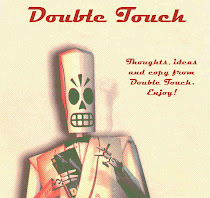Wednesday, 23 January 2008

With the acclaimed releases of Mass Effect from Bioware and Bioshock from Take 2, a long forgotten staple of game design appears to have re-emerged. Narrative. Although in no way could this be seen as a resurgence of the art.
Back in the days of yore games often lived and died by the story they took you on. They had nothing else after all did they? Crysis graphics? No. Reams and reams of music from the Moscow Symphony Orchestra? No (one must concede on this point though to that brilliant anomaly Outcast however). Serious hype across multiple multi-media mediums? No. Gameplay? Yes - but in very few cases. Room for thousands of Mbs worth of A-lister audio? No. The list goes on; and what did that leave you with? Narrative.
After all narrative was cheap and an effective way of "covering up" the lack of development/ finance the title had received. It gave the game a grounding point, gave you purpose, made the characters and worlds you were engaging with that more tangible; made everything that bit more engrossing. More importantly though it made you care for the characters.
Gladiator is one of the best films to be released in my generation and will help me prove the aforementioned point. When Russell Crowe, mortally wounded by Joaquin Phoenix while incapacitated, faces him one on one and kills him in gladiatorial combat against the odds, how did you feel? Good I bet! But why? Because you had been taken on his journey, seen his trials and tribulations, seen his wife and child murdered; you had been told a story and you were made to care for him. After all a film is escapism no? Just as a book is escapism and just as a game is escapism.
Of course escapism can be achieved without narrative but to what degree is debatable. With a good narrative your already half-way there. Equally take a narrative away from a game and in almost all respects you have only half a game. Take Bioshock's story away and what are you left with? A 75% fps! Not the 95%, contender for best game of 2007, title we received last year. Equally the same could be said for the 9/10 Mass Effect.
Both these titles currently fly in the face of the ever growing trend of less narrative, more bump-mapping. A trend that more than anything else is been driven by the console market.
Of course Bioware have always delivered a good story but with Mass Effect, one might argue that while they have delivered maybe not their best story, they have certainly delivered their most important.
1 Comment:
-
- Anonymous said...
24 January 2008 at 22:05Well done Rob, You make a good point. I hasten to point out that it could be argued that in art there is no such thing as escapism. The very nature of art, to hold the so called 'mirror' to society and ourselves is to help us understand our place. The reason we engage with art, be it Russel Crowe in gladiator or characters in Rapture, is because we recognise ourselves within the art. Be it through metaphors for our current climate, corrupt government as explored by the Roman empire, or societies worries of genetic research as in Bioshock. It is because we can identify and explore the world around us through narrative that makes it so important.
